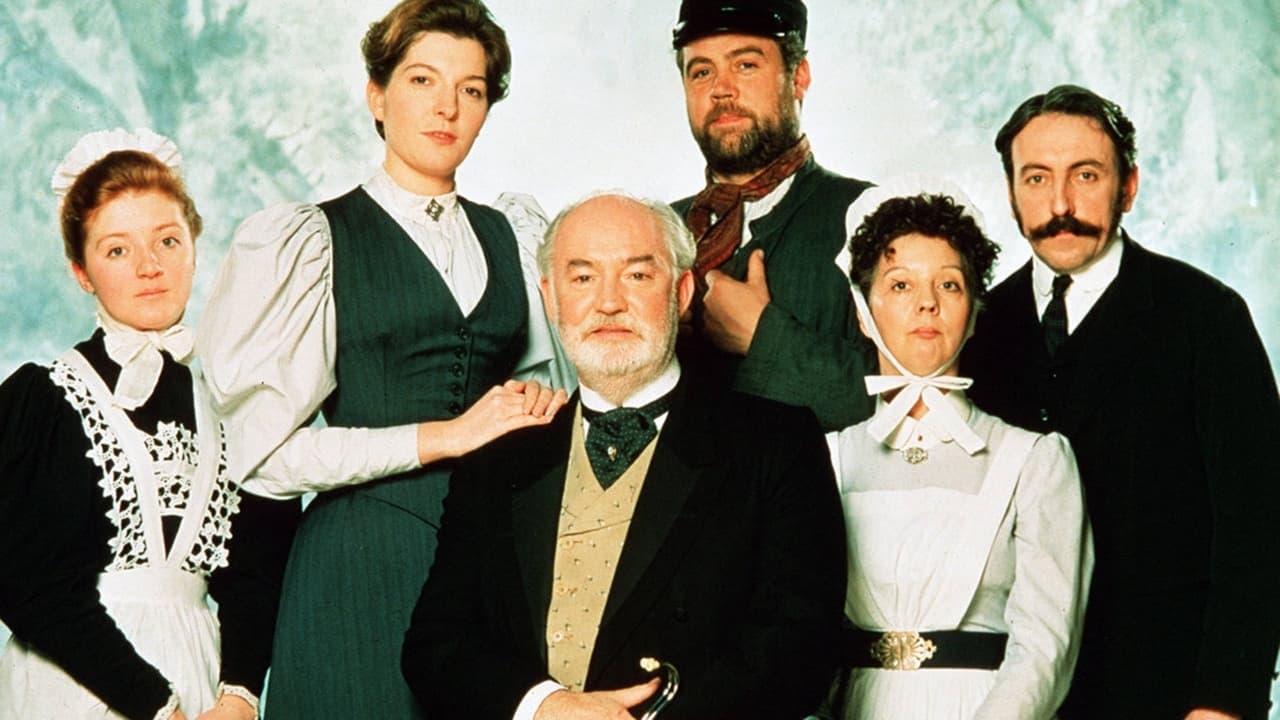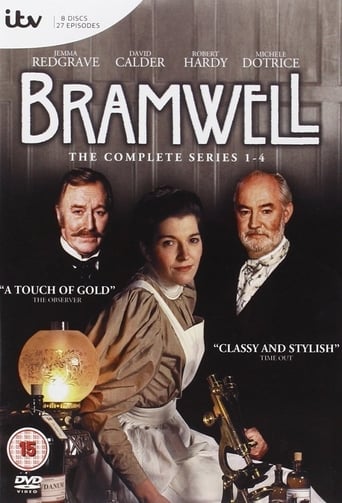

Slow pace in the most part of the movie.
... View MorePlot so thin, it passes unnoticed.
... View MoreI didn’t really have many expectations going into the movie (good or bad), but I actually really enjoyed it. I really liked the characters and the banter between them.
... View MoreThere's a more than satisfactory amount of boom-boom in the movie's trim running time.
... View MoreThe first three seasons, with all the flaws and occasional unnecessary emotional outbursts, make for a good series, one that develops reasonably well over the time period. I'll give it an 8. The end of the third season works as a good ending for the series, though admittedly, one wants to see a bit more. Especially how the warm but sometimes conflicting relationship between Drs. Bramwell and Marsham develops. Warning! If you've read the other reviews, you've heard this before: Do not watch season four! Heed this warning. The Bramwell-Marsham connection turns sour and bitter. The elder Bramwell, now married, is never seen again. Young Sidney, helper in the Thrift, is gone and the building itself is completely different. Nurse Carr becomes mean-spirited. And Eleanor goes off the deep end, abandoning the true nature of the Thrift to (unsuccessfully) take on the cause of child prostitution, longing to marry the military man who seems to represent everything she has been fighting against from the beginning; the relationship is totally unbelievable. Worst of all, the drivel this fourth series calls a story lasts for more than an hour and a half for each of the two painfully dark episodes in this abbreviated season. And the credits shown here on IMDb seem to indicate that the writer is the series creator and most prolific contributor, and the director(s) have done shows in other seasons. What happened?! The direction is abysmal, the photography horrendous, and the interludes of terrible music are completely incongruous and inappropriate. With every extreme closeup (I think at one time Eleanor's one eye and mouth filled the entire screen), with every strange angle of the camera, with every scene too dark to see yet creating no mood or ambiance, I kept asking, "What were they thinking? Who did this? Why???!" There is no good cheer or humor in the entire fourth season, yet there is nothing that involves us or informs us -- other than the overall message that life was tough then and woman and children were exploited, which was handled well enough in the first three seasons. Now, instead, we get religious overtones and a preachiness that could sour the devout. All in all, the fourth season was unrecognizable, from the storyline to the directing to the sets to the music. Even the acting was barely acceptable, and one has to wonder how the three leads who pushed on in a final season felt about their new characters. Since I give both episodes in season 4 a "1", I am forced to bring the show's rating down to "5"; best bet is to ignore the 4th season and take the first three, worth a healthy and hearty "8".
... View MoreI started watching this show (Netflix instant play) as background noise while I worked on some projects, but soon fell in love. I am particularly drawn to medical dramas, and this show was no exception. I love the relationship between the doctors Bramwell (Elanor and her father) and the hopefully somewhat-accurate depiction of the struggles a woman doctor might face in those times. I also love the depth of the more minor characters (Dr. Marsham, nurse Carr, Kate) and the witty humor and sarcasm employed.I was grossly disappointed by the fourth mini-season of the show, however. I was warned not to watch it, by a Netflix review, but gave into temptation. Now I repeat a similar warning: if you admire Elanor's strength and character (and especially if you are fond of Dr. Marsham) don't watch Season 4. I am now trying to trick myself into remembering the series as it ended in season 3 as I was so disgusted with what went on in Season 4. The creepy music used in the intro, and throughout the fourth season should have given me a head's up. Also, Sidnney was replaced with a weenie of a character that badly needed a shave, and Dr. Robert Bramwell didn't make an appearance. Perhaps if he had, he would have knocked some sense into his daughter.
... View MoreNo, she did not go off the rails. There is a reason the title puns on the phrase 'loose women.' Anyone with even a glancing acquaintance of Victorian England and the condition of women at the time would understand the psychological pressure of disenfranchisement that Bramwell faces. The cinematic depiction of the last season mirrored the exact horror and psychic fragmentation a woman like Bramwell (who has achieved something on the strength of reason and ability in a man's world) experiences when she realizes that Woman in her time is still the victim of her sex, that she will continue to be victimized and penalized as such (through prostitution and moral judgment), and that even a woman of birth and money like herself can be brought low by the circumstance of her sex (in her case, by unwed pregnancy).She refers to 3 women who matter, who needs to be saved—herself/her unborn child, Dora and another one. They are paralleled by the three men in the last episode—the soldier, the doctor, and the pious man, who should be the representative members of society helping the unfortunates, and who all know of the horrors but are unmoved by them.In the scenes leading up to her confrontation with the benefactor-to-be, she lashes out at the indifference and unfeeling reactions of every one who punishes and scolds women who fall foul of the sexual line but who will not act to prevent and protect women and children, even after they know the dangers and the persons concerned. Bramwell is in effect railing against social utilitarianism where the happiness of the masses is arbitrated by a self-appointed few (the doctors, priests, legal and juridical institutions deciding for the very women their society uses and abuses).The Victorian notion of duty marks the series of confrontations, when Bramwell is told off for taking 25 pounds to 'buy' the child prostitute. She is castigated and judged for being delinquent in keeping hours and money, even though her motivations were far higher than anyone around her. When asked why she did not try to rescue the child through the police, or the Salvation Army, or other social institutions, she says she does not know, but we do—when the fine upstanding men around her know and do little or nothing, can she depend upon them to take matters seriously and do right? Bramwell, through her actions, is trying to get people to recognize their true social duty—to do whatever possible to prevent vice and protect the possibility of innocence. When the child is found dead, it is the death of her innocence too.The nuns at the convent where Bramwell seeks a possible anonymous confinement supposedly do good work but they want to teach her humility. They are not accustomed to seeing women asserting their will in a man's world. Even as the brides of Christ are chaste, so must ordinary eves be, and their God is interpreted in man's image, harsh and exacting. Is it any surprise that Bramwell says that in the absence of god, she is sure He will understand if she steps in and does what she can to protect one child, i.e., in the manifest absence of the compassion that is divine, ordinary ungodly people must do what they can, and if there is indeed a benevolent God, He won't mind the interference of people such as Bramwell. On this point, her actions –judged as impulsive, thoughtless, etc.—are in stark contrast to the measured mercy of the priest.The dialog with her colleague and former fiancé who says she has brought it upon herself is very Victorian, and indeed very American (to attribute absolute responsibility for such a crime to the woman alone). It is interesting to note that not one of the people close to her intercedes with Major Quarrie who has made her pregnant on her behalf, until she berates him in the street. And then they punish her for her condition by dismissing her, showing so little concern for the future welfare and earning capacity for the two. Then and now, shame overrides self-reliance.The point, I think is to show the horror that lay beneath the cover of Victorian society. The men used and abused it more, and were inured to it. Bramwell, being judged for being pregnant, feels empathetic about the plight of children, she feels for the powerless children because she is fighting to retain power as a woman in a man's world, and is failing, just as the child struggled to remain at the hospital when Bramwell insisted that she go. When the child dies, Bramwell feels a sense of urgent personal responsibility, and struggles to convey this to the men who are more 'objective' and detached. She had been an extraordinary woman in a man's world, now she was forced to be a more ordinary woman in a man's world. The last episode shows her as 'breaking up' also because it is a representation of her through society's eyes—a woman who erred, as a woman, when all this time she had tried to be a less emotional creature—a woman who has finally fallen and broken. Society could forgive a woman for being a doctor like she was, for that transgression, but it would not forgive what it saw a hubris and overreaching. Bramwell could not be allowed to be both woman and man (be sexual, sexually liberal and eager, as men were allowed to be, for example, Dr. Marsham, who was never castigated for frequenting brothels except by Bramwell and even then he saw no merit in her accusations; did he take revenge for her disclosure in the street by helping her get dismissed?), and bear a child. The nun's words were telling — she must be made to learn humility through being made 'no different' from the other unfortunate women who came to the convent for their confinement.
... View MoreI have followed "Bramwell" since I started watching the mini-series on PBS's "Masterpiece Theatre" a few years ago. The depiction of a female doctor in Victorian England is very entertaining and groundbreaking. I strongly recommend it to anyone interested in period drama or the history of medical practice.
... View More